Table of Contents


Want to Boost Rankings?
Get a proposal along with expert advice and insights on the right SEO strategy to grow your business!
Get StartedWritten by Dileep Thekkethil
- Updated Nov 17, 2025
Reading Time: 14 min read
The competition in the financial industry is reaching new heights.
In today’s digital world, an established online presence is a must-have for financial advisors to compete and win more clients.
That’s why search engine optimization (SEO) for financial advisors has become essential.
Among all its strategies, link building is a proven technique that helps you build authority, credibility, and reputation.
It directly influences your ability to rank well on Google, earn trust from clients, and stand out in one of the most competitive industries online.
So, in this guide, you will learn everything about link building for financial advisors, starting from its importance to the techniques you can adopt to strengthen your backlink profile.
Keep reading!
Why is Digital Presence Important for Finance Advisors?
The way people seek financial advice has undergone a shift.
Free SEO Audit: Uncover Hidden SEO Opportunities Before Your Competitors Do
Gain early access to a tailored SEO audit that reveals untapped SEO opportunities and gaps in your website.

Over two-thirds of online experiences begin with a search engine, and more than half of all website traffic comes from organic search.
These numbers are even more relevant for you because people want to work with someone they can trust, and they often begin by searching online.
What makes things more competitive is that digital ad spending in the banking and lending sector is expected to grow by 20% by the end of 2025.
That means more advisors, firms, and financial platforms are all investing heavily to capture attention.
As a result, the race for online visibility is heating up rapidly.
The cost of paid search ads in finance is already high, with some keywords costing upwards of $4 per click.
For many advisors, this makes link building and organic SEO one of the most cost-effective long-term strategies for building brand visibility and generating qualified leads, without depleting an ad budget.
What Is Link Building in Finance?
To understand link building, you first need to know the different types of links that impact your SEO.
Internal links help users navigate within your website, making it easier for them to find related information and for search engines to understand your site’s structure.
Outbound links are those you place in your content to point to other credible sources.
They add value for the reader and show search engines that you’re part of a well-connected knowledge network.
However, the most powerful type is inbound links, also known as backlinks.
These come from other sites that choose to link to your content, and they’re one of the strongest signals that your site deserves to rank well.
In the financial industry, ranking for high-value keywords is a challenging task.
It is because when the competition for a keyword is higher, you need more backlinks to compete for that keyword and rank at the top of the search engine results page.
If it is done right, it is worth it.
The average return on investment for SEO in the financial services sector is over 1,000%, and many businesses achieve a breakeven point within a year.
For advisors who want long-term growth, this isn’t just a tactic—it’s a business decision.
Why Link Building Is Critical for Financial Services?
- Improved Search Engine Rankings
Search engines like Google use backlinks as a significant factor in determining a website’s authority and trustworthiness.
The more high-quality, relevant websites that link to a financial advisor’s site, the higher it’s likely to rank in search results, making it easier for potential clients to find them.
- Increased Brand Visibility
High search rankings from effective link building expose a financial advisor’s business to a wider audience actively seeking their services.
This increased visibility helps to establish them as a leading authority in the finance industry.
- Building Trust and Authority
In the financial services sector, trust is paramount.
When reputable sources, such as financial news outlets or industry publications, link to a financial advisor’s website, it serves as an endorsement, signaling to potential clients that they are a trustworthy and credible source of information.
- Driving Referral Traffic
While the primary goal of link building is often SEO, it can also lead to direct traffic to a website.
A well-placed backlink on a high-traffic financial website can introduce a financial advisor’s services to a new audience already interested in financial topics.
- Cost-Effectiveness
Compared to traditional advertising methods, SEO and link building offer a more cost-effective way for financial advisors to attract new clients and grow their practice.
- Long-Term, Sustainable Results
Link building provides lasting value.
Unlike paid advertising, which only yields results for as long as you pay, the benefits of earned backlinks can continue to boost visibility and traffic long after the initial link-building campaign concludes.
What are the Effective Link Building Strategies for Financial Advisors?
Now that you understand the importance and benefits of link building for financial advisors, let’s dive into the strategies you can adopt to increase your backlinks, improve your ranking, and attract quality leads.
1. Content Marketing
A solid link-building strategy starts with great content.
If you want high-quality sites to link to you, you need to give them a reason.
In-depth guides, research-backed whitepapers, and detailed case studies are ideal for this purpose.
They don’t just show off your expertise—they solve real problems for your audience.
When people find your content genuinely helpful, they’ll share it and reference it.
Take a look at US Bank. They’ve created a dedicated blog page to attract, educate, and improve brand awareness. The topics they have chosen are common ones that their audience is searching online.
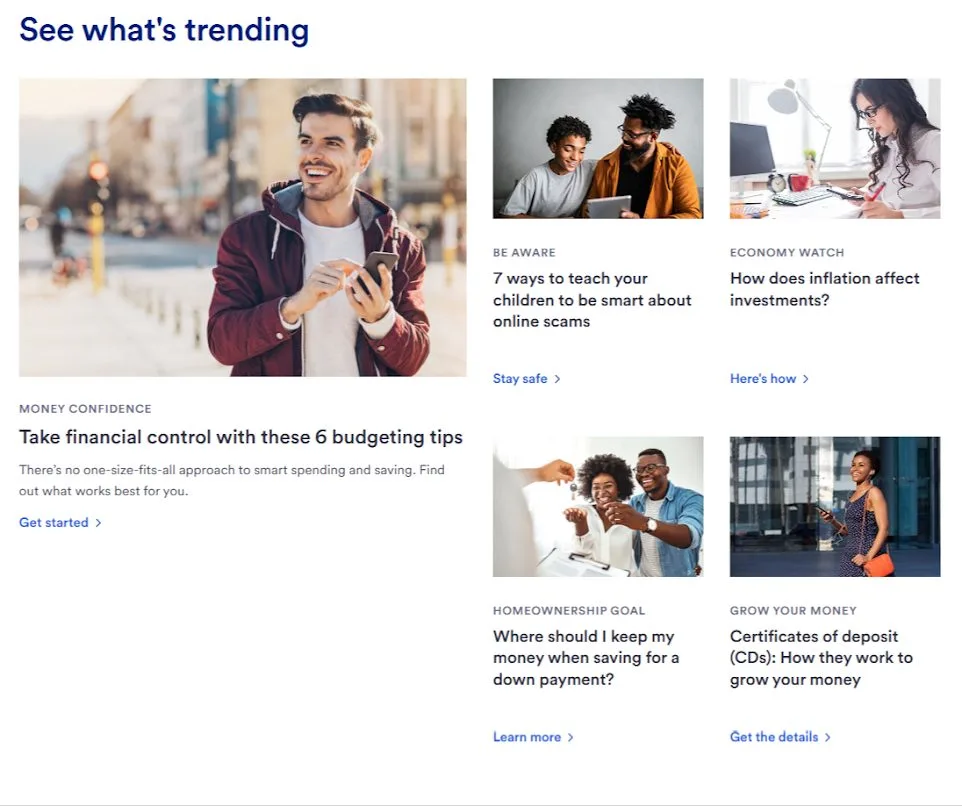
The next great technique is using data-driven content, as it is another effective way to attract attention.
If you can publish original research, surveys, or trend analysis, you’ll often find that others in the industry will cite your work.
This not only boosts your authority but also makes you a trusted source in your niche.
Here, look at Nareit, they have published a research paper highlighting the number of households people own REIT stocks in America.
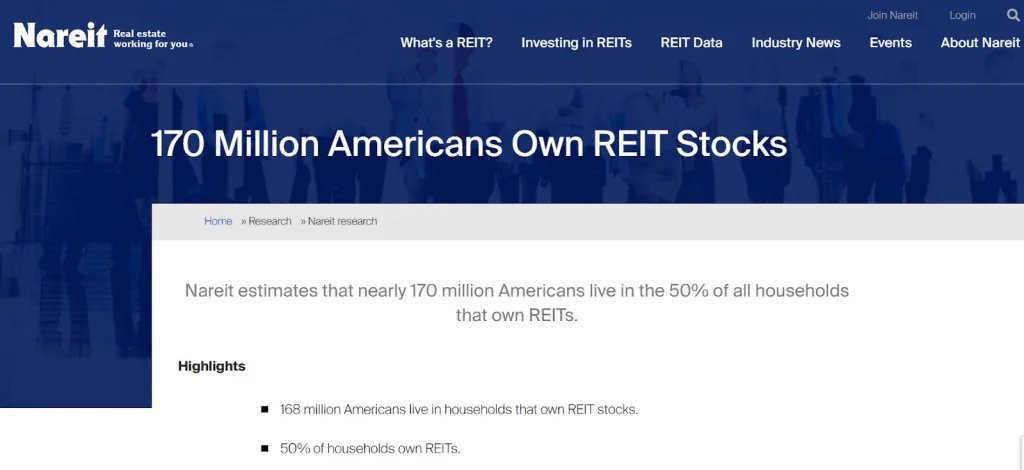
The third type of content format you can use is visuals.
Infographics, data visualizations, and short explainer videos are all highly shareable.
When other websites embed or share these visuals, they typically include a backlink to your site, which helps both your SEO and brand awareness.
2. Guest Posting
Guest posting is a proven link building strategy for finance.
When you write expert content for reputable finance publications, you position yourself as a thought leader and get a backlink in return.
But the key here is quality over quantity—choose platforms that align with your brand and audience.
So start by identifying a few high-quality websites that accept guest contributions.
To do that, Google “Write for Us + Finance,” where you can find sites that are relevant to your niche that allow guest posting.
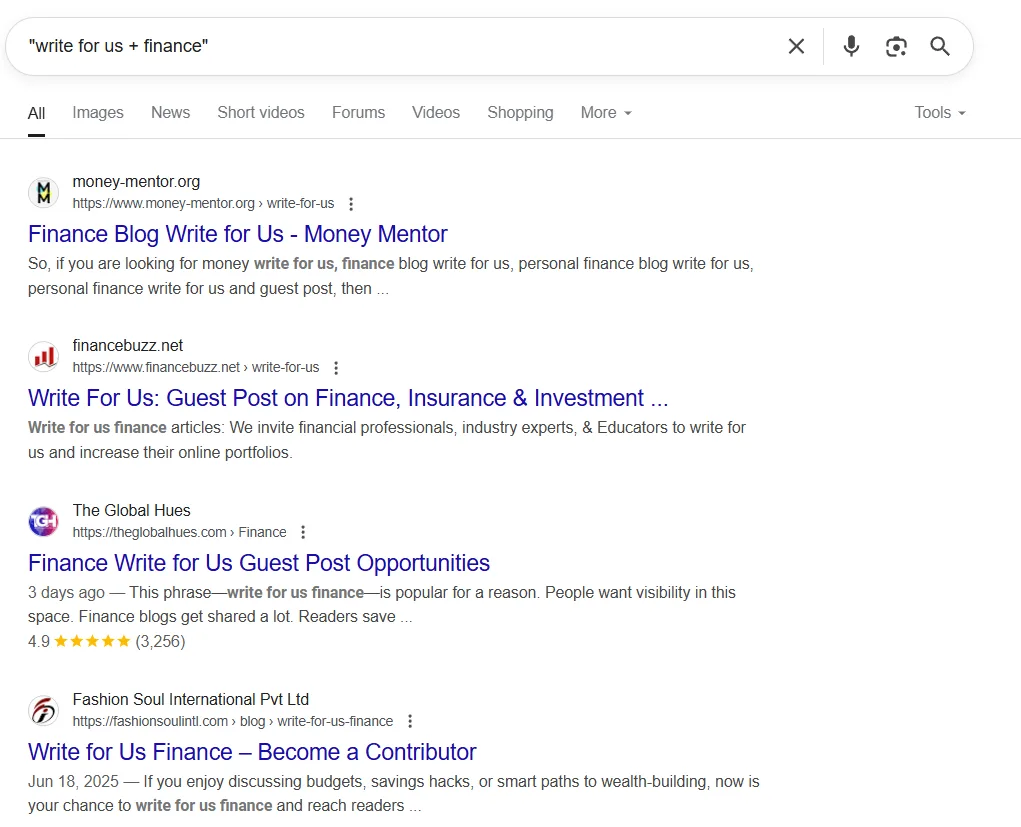
Collect all the sites in a spreadsheet and then analyze their domain authority, traffic, and bounce rate of the website.
Once you have found the right fit, pitch content that solves real problems or answers timely questions.
Ensure your insights are backed by data or experience, keeping compliance in mind.
If done correctly, guest posting helps you earn visibility, credibility, and traffic.
Consider using Stan Ventures’ professional guest posting services to save time and effort while building high-quality backlinks that add SEO value to your business.
3. Advanced Link Building Tactics
As you grow, you’ll want to level up your strategy. Here are some advanced link-building strategies:
a. Interactive Tools
You can also create interactive tools, such as retirement planners, savings calculators, or investment risk checkers.
These kinds of tools are incredibly useful, which makes them natural link magnets.
Here, look at Ameriprise Financial, which has implemented a retirement planner calculate on their website for free, to attract backlinks and customers.
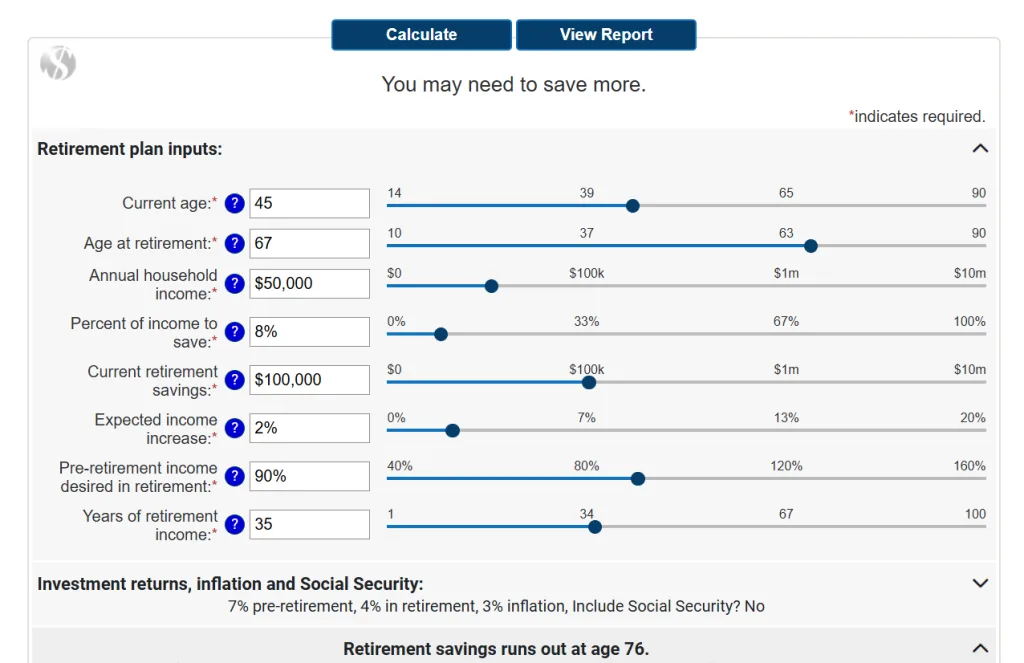
People love sharing practical resources, especially when they’re well-designed and easy to use.
b. Webinars and Online Events
Hosting webinars or online events can also help.
When you invite other experts, promote the session, and provide valuable insights, others will likely discuss it and link to the event page or a recap.
This kind of collaboration not only helps with SEO, but it also fosters genuine connections in the real world.
c. Forums
Getting involved in finance forums or online communities, such as Bogleheads or Reddit’s r/personalfinance, can also be effective.
But it’s important to contribute genuinely.
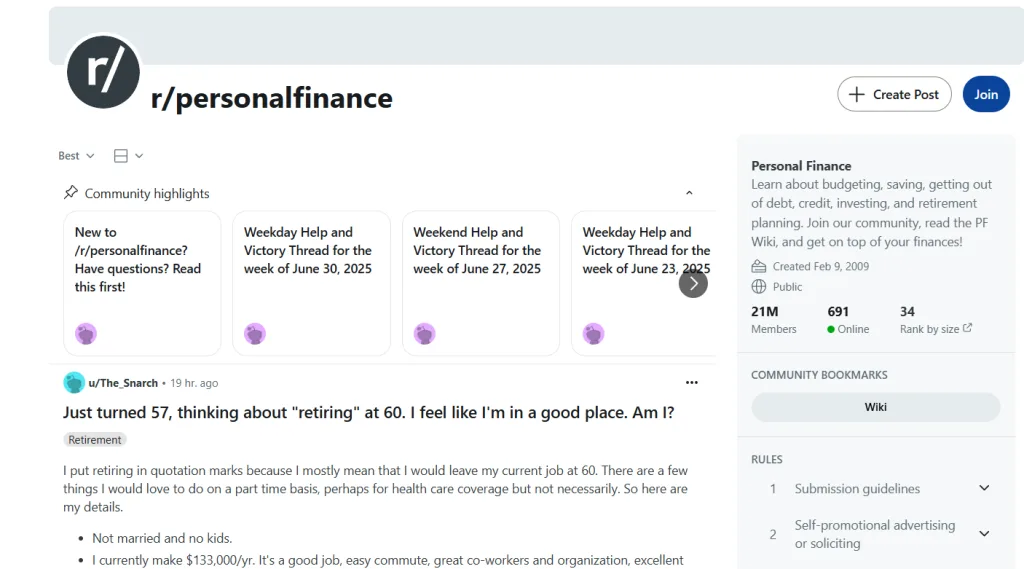
Help people by sharing advice or pointing them to helpful content on your site. Over time, this builds backlinks in an organic and trustworthy way.
4. Relationship-Based Link Building
Some of the most effective backlinks come through relationships, not automation.
Attend industry events, join virtual meetups, and engage with other professionals in your space.
These relationships often evolve into collaborations, such as interviews, co-authored articles, or cross-promotions—all of which can lead to high-quality backlinks.
Apart from collaborating with your industry people, teaming up with bloggers, podcasters, or influencers in the finance world can also be powerful.
By creating content together—like interviews, Q&A sessions, or expert roundups—you open the door for both audiences to benefit and link back.
You might feel pressured doing it all by yourself, that’s why you need a reputed SEO agency for financial advisors, like Stan Ventures.
We have established contacts across various financial industries, including bloggers, influencers, and podcasters.
We help you strengthen your backlink profile in quick time with a tailor strategy while you’re busy focusing on the growth of your clients and your business.
So, connect with our experts today for a free strategy call.
5. Outreach and PR Techniques
If you want to expand your reach even further, public relations can be a valuable asset.
One of the most effective and strategic ways to build backlinks is through direct outreach.
If you’ve published a new study or have a unique insight to share, reach out to finance bloggers or journalists.
Pitch them with a well-pitched story that’s timely and relevant, and you can earn a mention and a backlink.
6. Directory Listings
Directory listings are more than just online business cards.
They’re an opportunity to build trust, earn backlinks, and improve search visibility.
Listing your business on respected platforms like the CFP Board or NAPFA doesn’t just increase visibility—it often provides backlinks from high-authority domains that Google trusts.
As Google follows YMYL guidelines for financial websites, these backlinks send strong signals to search engines that your website is trustworthy and relevant.
Beyond the major directories, you can also explore advisor directories like SmartAsset, Paladin Registry, or WiserAdvisor.
These platforms are designed to connect financial professionals with individuals actively seeking help.
But when you’re choosing platforms, be selective.
Avoid low-quality directories that promise links for a fee.
These don’t help your SEO and could hurt your compliance standing.
7. Leverage Social Media
Sharing your content on social media platforms is one of the easiest ways to get it seen—and possibly linked.
Platforms like LinkedIn, X (formerly Twitter), and Facebook help extend your reach and give others a chance to engage with and share your content.
By regularly posting insights, blog articles, or answering trending questions in your niche, you stay top of mind while positioning yourself as an expert in your field.
8. Measuring and Sustaining Link Building Success
Tracking your results is critical if you want to see what’s working.
Tools like Semrush and Ahrefs enable you to monitor your backlinks, referring domains, and the ranking of your keywords over time.
But don’t stop there—look at how those links are impacting your traffic, your visibility, and your lead generation.
Some of the most important indicators include your domain authority, organic growth rate, and the number of new clients you’re bringing in.
These are the metrics that matter when it comes to ROI.
SEO is not set-it-and-forget-it.
Google is constantly updating its algorithms, sometimes hundreds of times a year.
That’s why it’s essential to remain flexible, adjust your strategy, and continue investing in what’s working.
9. Compliance and Risk Management
Never forget that every piece of content and every backlink needs to be compliant.
You’re operating in a regulated industry, and that means no shortcuts.
Always double-check that your partnerships, publications, and directories align with regulatory guidelines.
Transparency and disclosure are essential.
Avoid black-hat tactics, such as participating in shady backlink schemes.
They might work in the short term, but they can get you penalized or even deindexed.
The safest—and smartest—approach is to build links ethically. Focus on value, credibility, and long-term relationships.
How to Maintain Compliance and Ethics in Link Building for Finance Advisors?
Finance professionals operate in a regulated environment.
Everything you publish or promote online must follow guidelines from regulatory bodies such as the SEC or FINRA.
That includes your link-building strategy as well.
If you’re partnering with websites, guest posting, or participating in directories, you need to be transparent and ethical.
Avoid shady tactics, such as using private blog networks.
It does no good to cause harm, as it can lead to penalties that hurt both your rankings and your reputation.
The goal is to build trust, not just with search engines, but with real people who are counting on your advice.
What are the Emerging Trends in Link Building for Finance?
Looking ahead, AI is playing a larger role in how link building is conducted.
Tools now help you find outreach opportunities, personalize your emails, and scale content creation faster. But automation should never replace strategy.
You still need a human touch to build real trust.
Search engines are also evolving.
Google is giving more weight to E-E-A-T: Experience, Expertise, Authoritativeness, and Trustworthiness.
For you, this means doubling down on quality content, accurate information, and transparent practices.
The more you demonstrate real expertise, the better your rankings will be.
Conclusion
Link building isn’t just a technical task.
It is a strategic move that shapes how you’re seen online.
For finance advisors, it’s one of the most effective ways to gain trust, build visibility, and win clients in an increasingly competitive market.
By focusing on high-quality content, ethical outreach, and strong relationships, you’re not just building links—you’re building authority.
And that’s what keeps your business growing in 2025 and well beyond.
FAQs
How can Financial Advisors Create Content That Naturally Attracts Backlinks?
Focus on creating content that’s actually useful. In-depth guides, original research, and interactive tools like calculators or checklists tend to attract the most links. When your content solves real problems or offers unique insights, people naturally reference it.
Are there any risks or special considerations for link building in the financial industry?
Yes, and they’re important. Since finance is a heavily regulated space, any content or partnerships tied to your link building must follow industry rules. Avoid low-quality links or anything that feels promotional without context. Stick with ethical, relevant backlinks from trusted sources to protect your reputation and stay compliant.
What are effective link building strategies for financial advisors?
Start with value-driven content, such as original research, expert guides, or client case studies. Pair that with guest posts on credible finance sites, and get listed in trusted directories like the CFP Board or NAPFA. You can also earn links by building local partnerships, engaging in PR, or contributing to industry conversations that drive recognition and trust.
About the author
Share this article
Find out WHAT stops Google from ranking your website
We’ll have our SEO specialists analyze your website—and tell you what could be slowing down your organic growth.
What People Say About Us
Hear from our clients about their experience with our high-quality SEO services.
Join the 2500+ business that trust our SEO optimization services






























 5
5


